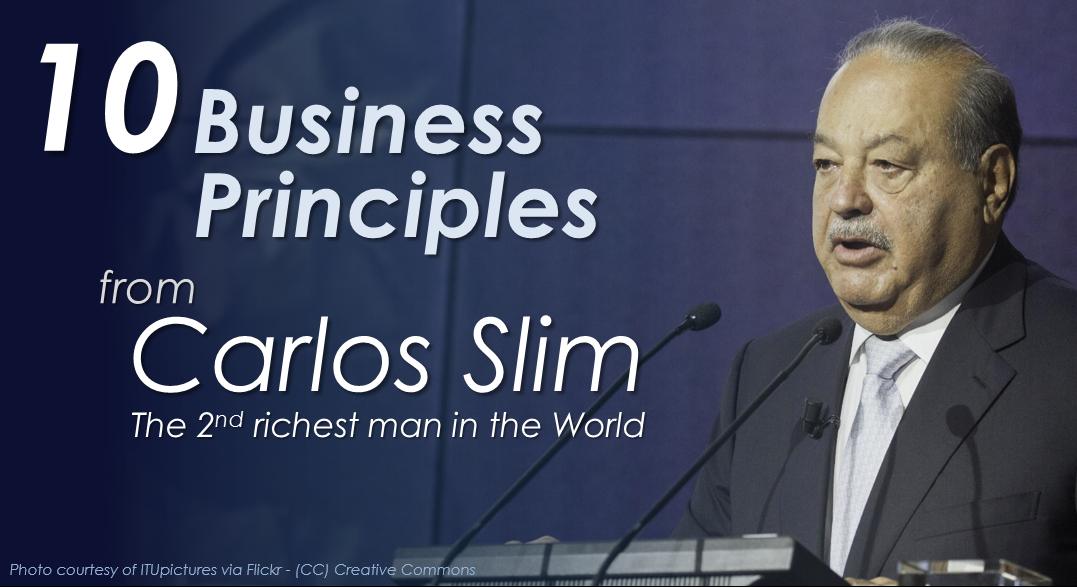As I write this, Carlos Slim Helú is the second richest man in the World, according to Forbes, following Bill Gates by a ‘mere’ $2 billion dollars. Carlos was number one in 2010 and 2011. Everyone knows how Bill made his fortune, as the founder of Microsoft, and much has been written about him. But what drives Carlos Slim’s success, and what are the strategies that make his companies so successful seem to be more of a mystery.
When companies struggle, they usually blame increased competition and unfavorable economic conditions. Carlos Slim seems to thrive on downturns and recessions.
Slim’s business portfolio, under the holding company Grupo Carso, is much more diversified: it includes real estate, retail, telecom, mining, financial services, tobacco, aluminum, tires, copper, insurance, restaurants, oil and gas, paper, hotels, and more.
People in Mexico say you can’t live a day of your life without somehow giving money to Slim’s empire. He has also made significant investments in the US. In 1997, Carlos purchased 3% of Apple for $17 a share. He has made significant investments in Saks and the New York Times and in business that have gone south like Prodigy and CompUSA.
Carlos is 75 but he has been very aware of technology advances and has positioned his companies to take most advantage of them: “Technology is going to transform people’s lives and society everywhere in the world. My main task is to understand what’s going on and try to see where we can fit in.“
Making money in a downturn.
An aspect of Carlos that is unique, is that he made a significant part of his fortune during one of the hardest economic recessions in Mexico. His strategy was to find relatively healthy companies that were undervalued based on overly negative sentiment.
“The collapse of investor confidence, currency exchange and prices led to inexplicably low prices for very valuable companies that had no major financial problems” For example, Cemex, one of the largest cement companies in the World, was worth 26 million dollars – as of today (January 2016) it is worth $60 Billion.
Monopolies and competition.
Carlos has been criticized for making money in a monopoly, mainly because of his role in buying TelMex, the Mexican telephone Company, as it was privatized. It is a fact he profited from what for many years was a monopoly, but the truth is that he had a single-digit ownership of the company initially, and it’s partners SBC (AT&T) and France Telecom made much more money from the transaction.
With such a diversified portfolio, in almost every other company where Carlos has a majority interest, he has faced fierce competition. He actually seems to enjoy it.
“The truth is, if you look at the history of the group (Grupo Carso, his holding company), we have done better when we have competed because in reality competition makes you better, always, always makes you better, even if they beat you.”
10 business principles that drive Carlos Slim’s success
Carlos Slim Helú summarizes what he considers to be Grupo Carso’s business principles in these 10 points, which guide his employees every day, and could be the reason of the continued success of his companies:
- Always have simple organizational structures, minimal hierarchical levels; provide human and in-house development of the executives; maintain flexibility and fast decision-making capability; work with the advantages of a small company.
- Maintaining austerity in good times strengthens, capitalizes and accelerates the development of the company, and averts the bitter and drastic adjustments needed in times of crisis.
- Stay focused on modernization, growth, training, quality, simplification and the continuous improvement of production processes. Increase productivity and competitiveness; reduce costs and expenses, judge performance based on global benchmarks.
- Companies should never be limited by the size of the owner or manager. Do not feel big in our small corral. Minimize investment in non-productive assets.
- There is no challenge that we cannot overcome by working united, and with clear vision in the goals and knowing the tools.
- Money that leaves the company evaporates; this is why we reinvest profits.
- Corporate creativity is not only applicable to business, but also to solving many of society’s problems. This is what we do through the Group’s Foundations.
- Firm and patient optimism always yields its rewards.
- All times are good times for those who know how to work and have the means to do so.
- Our premise is and has always been that we leave with nothing; that we can only do things while we are alive and that entrepreneurs are creators of the wealth they temporarily manage.
On Carlos Slim’s Personal Philosophy
Slim’s philosophy on life can be found in a letter to students he published in 1994. Here is a summary of what I found most relevant:
On Success – “Success is not about doing things well or even very well, or being acknowledged by others. It is not an external opinion, but rather an internal status. It is the harmony between the soul and your emotions, which requires love, family, friendship, authenticity and integrity.”
On what matters – “What is most valuable in life does not cost anything but is very precious: love, friendship, nature and what man has been able to achieve with it. [There are] values that are much more important than professional, economic, social or political “success”…. ”Do not mix up your values or betray your principles.”
“Emotional strength and stability are in the interior life, and in avoiding emotions that erode the soul such as envy, jealousy, arrogance, lust, selfishness, vengeance, greed and laziness, which are a poison.”…
On legacy – “Work well done is not only a responsibility to yourselves and society; it is also an emotional need. At the end we depart with nothing, we leave behind only our work, family and friends, and, perhaps, a positive influence”

